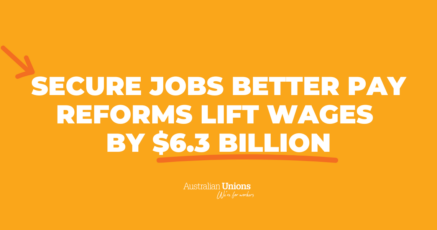By Chloe Ward
In the past two weeks, we have seen Scott Morrison and his ministers do everything they can to avoid scrutiny, and accountability, for their botched response to Brittany Higgins’ accusation of rape against a former Liberal Party colleague.
There could not be a greater contrast with Higgins’ courage, determination, and clarity.
Higgins, a former Liberal staffer herself, deserves transparency about who knew what, when, and how they responded to her complaint. So too do the many Australian women, inside and outside politics, who experience sexual harassment in the workplace. They also deserve a government that will do everything it can to protect women, and all workers, from harm.
Australian Unions has consistently advocated for changes to workplace laws and increased powers for the Sex Discrimination Commissioner, to help protect workers and ensure their rights to justice.
One year ago, Sex Discrimination Commissioner Kate Jenkins handed down the Respect@work report, finding that Australian laws fail to keep workers safe. Jenkins made 55 recommendations for reform. Scott Morrison has acted on none of them.
“Sexual harassment at work is rife across Australia and our current laws are failing to keep workers safe,” ACTU President Michele O’Neil said last week.
“The Federal Government were given 55 recommendations for protecting workers against sexual harassment in all workplaces 12 months ago and instead they chose to sit on their hands and do nothing.”
“They have failed to act on any of the recommendations of their own report.”
This is part of a pattern by the Morrison Government. It’s so utterly predictable that it would almost be boring, if the consequences of the Prime Minister and his Government’s inaction weren’t so serious.
This week Lisa Heap, labour lawyer and former Executive Director of the Australian Institute of Employment Rights, told ABC RN Breakfast that the confused response to Higgins’ allegations is symptomatic of a wider problem.
“There’s a great amount of confusion about what should have happened once it became apparent that this had occurred,” Heap said.
“Enquiry after enquiry after enquiry has occurred in relation to why we have sexual harassment, assault and rape in Australian workplaces. We know the factors that are in play. We should be talking about how we can plan to mitigate the risk of those happening and have better responses.”
More than half of nearly 10,000 respondents to a 2018 ACTU survey said they had experienced sexual harassment in the workplace, and two-thirds said they had witnessed sexual harassment. But only 27 per cent made a complaint, and more than 40 per cent told no one at all.
Why not? Because they feared the consequences for their employment, and because they had no faith in the complaints process. As for people who did complain, more than a quarter said it led to negative repercussions—including bullying or being forced to shift jobs or resign—and most were not satisfied with the outcome of their complaint.
Every employer has a responsibility to protect its employees from sexual harassment and assault. Many of them don’t. And why should they, after the revelations from Parliament House – the place where the laws that protect workers from sexual harassment are meant to be made?
The Morrison Government has failed to act on workplace sexual harassment. But the situation is urgent, and it’s still with us. So what can you do if you or someone you know is being sexually harassed in the workplace?
The Australian Unions Support Centre has created this factsheet about sexual harassment and what to do about it. Writing down instances of sexual harassment, so there’s a detailed record of what happened; telling a trusted colleague; confronting the perpetrator if it’s safe to do so and making an internal or external complaint can help stop harassment, keep workers safe, and hold perpetrators accountable for their actions.
But every situation is different, and unions can give more support and advice for specific situations.
The Support Centre is also available by phone on 1300 486 466 to give free and confidential information and advice. If you or someone else, is being sexually harassed in the workplace, one of the best things you can do is contact your union—because no one should have to face sexual harassment alone.






SHARE:
Sexual harassment: Australian workers deserve much, much better